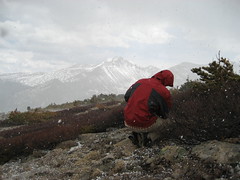Cape Breton

Ingonish

Peggy's Cove



Mum + Me near Sylvan Park

My family admiring a swan family near Thickson Woods



Close to flat top mountain in rocky mountain NP



August 29, 2009
Thursday AM, work lunch with Sara. She is focusing on inforce risk monitoring while I'm involved with new product risk management. Good to touch base regularly.
Thursday PM, fellowship celebration for Wei.
Saturday, saw Alps with A at Science Centre. Gotta try mountaineering some day!
August 24, 2009
Friday, saw District 9 with A. Second half too predictable. Interesting concept nevertheless.
Sunday, Rogers Cup final with Steven and Albert. I cheered for Elena while Steven cheered for Maria :) Guess who won?
Monday, night swim in Lake Simcoe.
August 16, 2009
Friday, lunch with Iris at Montreal Bread Co. She joined Manulife not long before me so we shared thoughts on being newbies.
Saturday, tried steamed eggplant + sesame sauce recipe from Denise. Yummy :)
Sunday, saw "How about you?" with A. An Irish comedy starring Vanessa Redgrave. Pretty warm and fuzzy given the topic is aging and dying. I'm still not sure which is more scary. Being too old to remember the good things in life. Or leaving it all behind.
August 10, 2009
Thursday, A is back from his two week whitewater trip.
Saturday, Carl visiting Toronto! Armed with three bottles of wine! Denise and A joined us for dinner at La Forchetta. Cured muskox and mushroom risotto were delish. Afterwards, we went for some music at Drake. Denise kept asking crazy relationship questions. Sigh >.<
Sunday, finally saw Grave of Fireflies with mum and dad. Always amazing to see the world through the eyes of children. Now my mum wants to read my manga.
This summer has been great for strolling after work. Monday, A and I walked from Bloor to York Mills. Picked up a little riesling at the LCBO in Summerhill. Detoured through a garden.
August 4, 2009
Thursday, Coldplay concert with Stephen. Sigh ...
Friday to Tuesday, amazing long weekend with parents in Nova Scotia. Pleasant Bay. Cape Breton. Peggy's Cove. Pier 21.
Krugman: High-frequency trading probably degrades the stock marketís function, because itís a kind of tax on investors who lack access to those superfast computers ó which means that the money Goldman spends on those computers has a negative effect on national wealth. As the great Stanford economist Kenneth Arrow put it in 1973, speculation based on private information imposes a ďdouble social lossĒ: it uses up resources and undermines markets.
July 31, 2009
Modern Love: Hereís a visual: Child throws a temper tantrum. Tries to hit his mother. But the mother doesnít hit back, lecture or punish. Instead, she ducks. Then she tries to go about her business as if the tantrum isnít happening. She doesnít ďrewardĒ the tantrum. She simply doesnít take the tantrum personally because, after all, itís not about her.
Let me be clear: Iím not saying my husband was throwing a childís tantrum. No. He was in the grip of something else ó a profound and far more troubling meltdown that comes not in childhood but in midlife, when we perceive that our personal trajectory is no longer arcing reliably upward as it once did. But I decided to respond the same way Iíd responded to my childrenís tantrums. And I kept responding to it that way. For four months
July 30, 2009
NYTimes: In the months since A.I.G. received its $182 billion rescue from the Treasury and the Federal Reserve, state insurance regulators have said repeatedly that its core insurance operations were sound. But state regulatory filings offer a different picture. They show that A.I.G.ís individual insurance companies have been doing an unusual volume of business with each other for many years ó investing in each otherís stocks; borrowing from each otherís investment portfolios; and guaranteeing each otherís insurance policies, even when they have lacked the means to make good.
July 25, 2009
SHEILA BAIR: I discovered childrenís picture books when I had children and began reading to them. I loved the combination of the written word and a visual depiction. Itís great family time, too. That gave me the idea to write childrenís books that would educate children about finance. I thought it could be a powerful way to convey information to children, and that parents would pick it up, too. Iíve written two.
July 23, 2009
Monday, dinner with Stephen and Denise at Solo Sushi. Stephen is dating a really cute girl with a really cute name :)
Wednesday, dinner with A at Kaiseki Sakura. Blow torched mackerel marinated in sweet vinegar is so good!
Thursday, passer's night at Manulife. Writing exams seems like another lifetime.
July 19, 2009
Wednesday, harbourfront walk with A. The new photo exhibit, RESPECT, inspires northern adventures.
Friday, crepe dinner with Wei and Hong. The end of exams = the start of thinking about the rest of our lives, which can be rather intimidating.
Saturday, beautiful walk with mum and dad along the green/blue lake near Sylvan Park.
Sunday, science centre with A.
July 14, 2009
Wednesday, dinner with Denise at Japango.
Thursday, lunch with Andrew. I see him at work all the time since his area (variable annuity research) is very close to mine (product risk management).
Fri/Sat/Sunday, Algonquin hiking with A. Skinny dipping in a serene lake.
July 9, 2009
Economist: Todayís opaque pensions system is unfair to private-sector workers, who suffer a triple whammy. First, most are now enrolled in riskier defined contribution (DC) pension schemes, where payouts depend on investment performance. Second, employers make smaller contributions to DC schemes than to final-salary plans, so pensions are likely to be lower. And third, as well as shouldering more of the burden for their own retirement, private-sector workers pay for public-sector pensions via their taxes. There is, in effect, a hidden transfer from private-sector workers to their public-sector peers. In Britain it may amount to as much as 30% of pay.
July 7, 2009
Economist: In his new book Mr Collins examines 11 of the 60 ďgreat companies?studied in his two earlier books that have since deteriorated to ďmediocrity or worse? By comparing each one, where possible, with similar firms that had fared better, Mr Collins identifies five stages in the process of decline.
Stage one is hubris born of success (possibly brought on by reading the case study of the firm in one of Mr Collinsís earlier books). They become dogmatic about their specific practices and fail to question their relevance when conditions change.
Stage two is the undisciplined pursuit of more: firms overreach, moving into industries or growing to a scale where the factors behind their original success no longer apply.
Stage three is denial of risk and peril. Warning signs mount, but the firmís headline performance remains strong enough for bosses to convince themselves that all remains fine. Problems are invariably blamed on external causes.
In stage four the problems are clear enough that firms start grasping for salvation. Rather than returning to the fundamentals that made them great, they gamble on a new, charismatic saviour-boss, dramatically change strategy, make a supposedly transformational acquisition or fire some other supposedly silver bullet. The longer a company remains in stage four, the more likely it will spiral downward into stage five: irrelevance or death.
ďOur research shows that if youíve been practising the principles of greatness all the way along, you should get down on your knees and pray for severe turbulence, for thatís when you can pull even further ahead of those who lack your relentless intensity.?
July 2, 2009
Friday, dinner with Xi/chel + Bri/yanta.
Saturday, attended Heather's wedding in London with steven Chen. Love the sprinkler fountain where the Thames bends.
economist: By boosting technology and co-operation across the bureaucracy, this would seem to promise improvements throughout Indiaís moribund public sector. It might also provide the standard form of identification for opening a bank account, a humdrum pleasure that two-thirds of Indian households have yet to enjoy. Daring to look further, Mr Nilekani imagines the system inspiring Indian service providers to develop new technologies to take fuller advantage of it. Thus, for example, it might help give Indians a wider range of financial services.
June 30, 2009
Sunday, saw Steven play his last soccer game before the playoffs.
Tuesday, saw UP with A. What happens after happily ever after?
Wednesday, A took me for a walk around Sylvan Park. Such a magical place! Followed by sushi. Followed by fireworks near Ontario Place.
June 25, 2009
Tuesday, midnight swim with A in Lake Simcoe.
Thursday, tried to visit a gallery but it was closed. Boo-hoo. A tried to make me feel better by saying the walk was nice. It's the journey, not the destination, right?
June 22, 2009
It seems that I caused some concern with my entry below >.< Actually, I decided to leave for personal reasons. I have too many great things going on in Toronto right now to spend four days a week out of town.
June 21, 2009
Saturday AM, Denise and I participated in a program called "Through the Garden Gate". Private gardens full of weeping trees are so pretty!
Saturday PM, saw Decline of the American Empire with A. The part where she tries to talk to him and he pretends to be asleep just kills me.
Sunday, biked to Toronto Music Garden with mum and dad.
June 19, 2009
Today is my last day at OW. Leaving a job in less than two years is less than ideal, but I am happy to say that I seized the opportunity to benchmark myself and identify areas most in need of improvement.
-Communicate simply. Use pictures, as opposed to numbers, as much as possible.
-Structure. Structure. Structure. The more urgent a task, the more important this becomes. Regardless of the size of the task, I need to spend more time structuring before I dive in.
MS: In past month, there has been a flood of new capital issuance from the Life Insurers. A total of $14 billion of fresh capital has been raised, with $5 billion of equity offerings accounting for much of the influx. On average, risk-based capital ratios have moved to over 490%, up from just over 400% as of the end the first quarter, positioning most companies to be able to weather a severe stress scenario.
WSJ: At the joint hearing held by the SEC and the Department of Labor to examine target date funds, witnesses and regulators questioned everything from how the funds are named and marketed to how their investment mix changes over time. The design and performance of target-date funds has become especially critical since 2006, when pension legislation encouraged employers to automatically enroll workers in 401(k) plans and invest their contributions in these funds. The funds "are not designed to be riskless or to provide a guaranteed amount of retirement income," said John Americas of Vanguard Group. "Diversification is not insurance."
June 18, 2009
Economist: In America, where retail investors are more willing to buy funds directly, the expense ratios of mutual funds have declined for four successive years, according to Lipper, a provider of financial information. But in Europe, where funds are largely sold through banks, annual management fees have steadily risen, from 1.3% in 1994 to 1.6% last year.
June 14, 2009
Saturday, first family biking event this summer. Mum and dad and I went down to the beach and came up via Woodbine, the flattest way up in my opinion.
Sunday, saw Devil's Disciple in Niagara on the Lake. Gorgeous waters. Gorgeous skies. The American Fort on the other side might as well be a resort.
MS: We have long been cautious of the assumption that the [non life] claims environment is uncorrelated to the economy. Despite our suspicions we were unable to find compelling evidence of correlations between the economy and claims behaviour.
June 13, 2009
NYTimes: [JPMorgan] provided key manpower and initiative in a ferocious Wall Street lobbying campaign that persuaded Congress, the Securities and Exchange Commission, and the Clinton and Bush administrations to back off from regulating derivatives trading in any meaningful way.
June 12, 2009
Ran into William at client site. He's in the next conference room. I'm guessing this part of the buliding is known as consultant row.
Wednesday, team event with Aaron and Jeff B. Huuuge sundae at serendipity followed by hungover, the movie.
Friday, Ed and Steve are visiting Steven. We walked around King West and downed a few shots of scotch at Drake. Steven really enjoyed reading Jamie Dimon's letter to fellow shareholders, so I gave it a try.
-The only reason to get bigger and gain economies of scale is when doing so enables you to do a better job for your clients; i.e., by giving them more, better and faster at a lower cost. Ultimately, this is also the only real reason to do a merger ?the client gets something better.
-Under normal conditions, the price we ultimately paid for Bear Stearns would have been considered low by most standards. But these were not normal conditions, and because of the risk we were taking, we needed a huge margin for error. We were not buying a house ? we were buying a house on fire.
-We essentially stayed away from sponsoring structured investment vehicles (SIV) because we viewed them as arbitrage vehicles with plenty of risk and a limited business purpose.
-We didnít write option ARMs (adjustable rate mortgages) because we did not think they were a consumer-friendly product.
-A very good argument could be made that the lower standards of the unregulated parts of the business put a lot of pressure on those players in the regulated part of the business to reduce their standards so they could compete.
-During this crisis, it became evident that our system created enormous pro-cyclical tendencies. In fact, I canít think of one counter-cyclical policy at all (other than emergency actions taken by the government).
-We believe these mortgage modifications are economically and morally the right thing to do and that the program underscores the importance of mutual respect ?by treating others in the way that we would like to be treated in the same situation ?while upholding the essential principle that individuals, businesses and corporations should repay their loans if they can afford to do so.
-The problem itself could have been better contained and dramatically mitigated had AIG been properly regulated and required to provide collateral (to a clearinghouse or its counterparties).
-Recognizing upfront profits for derivative transactions can be problematic. Even though it is not standard accounting, we believe the profits relating to the risk positions associated with derivatives should be booked over the life of the transaction, proportionate to the risk remaining.
June 7, 2009
Friday, Met A at LGA.
Saturday, walked from midtown to the Met with a quick stop at an espresso bar. Roxy Paine's Maelstrom blends perfectly with views of New York above Central Park. Shiny version of organized chaos. Emergency sneaker shopping since I left my scandals at the client site and I do not have weekend access. Finally visited Cloisters up in Washington Heights. We sat on the grass and enjoyed complimentary string quartet performance. It's crazy how much money people spend on weddings but I will not complain as long as they provide public access to great music.
Sunday, visited intrepid air and water museum.